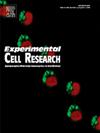Establishment of a genetically amenable fibroblast cell line from Atlantic salmon skin
IF 3.3
3区 生物学
Q3 CELL BIOLOGY
引用次数: 0
Abstract
The Atlantic salmon, Salmo Salar, is a societally important species of fish, both as a food source and as a component of aquatic biosphere. Its sustainable production is hampered by a wide range of infectious diseases, which is difficult to address due to the lack of in vitro tools to study the disease-host interaction. In this paper, we describe the establishment and characterization of a homogenous Atlantic salmon skin fibroblast (ASSF) cell line. This immortalized cell line grows well in standard media formulations and is capable of migration. It is transcriptionally stable over dozens of passages, and its transcriptome is distinct from other publicly available Atlantic salmon cell lines (SHK1 and ASK). Even though ASSF cells show limited cytopathic effects when challenged with Infectious Pancreatic Necrosis Virus (IPNV) molecular evidence reveals that they are infected and support IPNV production, especially compared to other cell lines like ASK or SHK1. The potential of the ASSF cell line as a tool for Atlantic salmon research is highlighted by its permissibility to genetic manipulation with various methods including CRISPR/cas9, transfection and transduction.
从大西洋鲑鱼皮肤中建立可遗传的成纤维细胞系。
大西洋鲑(Salmo Salar)是一种对社会非常重要的鱼类,既是食物来源,也是水生生物圈的组成部分。大西洋鲑的可持续生产受到多种传染性疾病的影响,由于缺乏研究疾病-宿主相互作用的体外工具,很难解决这一问题。在本文中,我们描述了同源大西洋鲑鱼皮肤成纤维细胞(ASSF)细胞系的建立和特征。这种永生化细胞系在标准培养基配方中生长良好,并具有迁移能力。经过数十次传代后,它的转录稳定,其转录组与其他公开的大西洋鲑鱼细胞系(SHK1 和 ASK)不同。尽管 ASSF 细胞在感染传染性胰腺坏死病毒(IPNV)时表现出有限的细胞病理效应,但分子证据显示,它们受到感染并支持 IPNV 的产生,尤其是与 ASK 或 SHK1 等其他细胞系相比。ASSF 细胞系作为大西洋鲑鱼研究工具的潜力突出表现在它允许使用各种方法(包括 CRISPR/cas9、转染和转导)进行遗传操作。
本文章由计算机程序翻译,如有差异,请以英文原文为准。
求助全文
约1分钟内获得全文
求助全文
来源期刊

Experimental cell research
医学-细胞生物学
CiteScore
7.20
自引率
0.00%
发文量
295
审稿时长
30 days
期刊介绍:
Our scope includes but is not limited to areas such as: Chromosome biology; Chromatin and epigenetics; DNA repair; Gene regulation; Nuclear import-export; RNA processing; Non-coding RNAs; Organelle biology; The cytoskeleton; Intracellular trafficking; Cell-cell and cell-matrix interactions; Cell motility and migration; Cell proliferation; Cellular differentiation; Signal transduction; Programmed cell death.
 求助内容:
求助内容: 应助结果提醒方式:
应助结果提醒方式:


